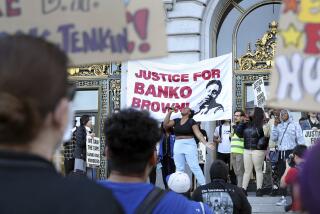Letter Seeks Funds for Imprisoned Koon : LAPD beating: The plea, seemingly written by the convicted former sergeant, portrays him as a scapegoat. It stretches truth, describing Rodney King as a PCP-crazed murder suspect.
- Share via
The book publisher for Stacey C. Koon, the former Los Angeles police sergeant serving prison time in the beating of Rodney G. King, has circulated a mass appeal for donations to help Koon’s family and to help him appeal his federal civil rights conviction as far as the U.S. Supreme Court.
The letter, which purports to be written by Koon and bears his letterhead and signature, has been sent out nationwide in recent months under the auspices of the “Stacey Koon Defense Fund,” operated out of a mail drop in Glendale.
It has generated much financial support from police officers and others for Koon, his wife and their five children, according to Koon’s Washington-based book publisher, who organized the fund-raising effort.
In the letter, which the publisher said was largely written by Koon, King is lambasted as a PCP-crazed homicide suspect at the time of his arrest who never was struck in the head with police batons and “only suffered minor injuries when finally forced to the ground.”
These are assertions that court evidence, and even one of Koon’s former lawyers, say are unproven or untrue. Koon, serving 30 months in federal prison in Dublin, Calif., could not be reached for comment.
The four-page typeset letter also claims that Koon and former Officer Laurence M. Powell, also serving time in the King beating, “are the political scapegoats of black radicals and self-serving liberal politicians who know that we are innocent.”
The letter quotes Koon as saying that when the whole story comes out, people will be “shocked, stunned and convinced that my officers and I were sold out by weak politicians and a deceitful news media.” Until then, he asks readers of the letter for as much as $1,000 each so he and Powell can appeal their cases and get out of prison before they are killed by police-hating inmates.
“That will take dollars,” the letter says, “lots of them.”
The publisher of Koon’s book, “Presumed Guilty, The Tragedy of the Rodney King Affair,” said this week that he came up with the fund-raising idea.
Alfred S. Regnery, president of Regnery Publishing Inc., said most of the money raised will go to Koon’s family and to pay his legal bills.
But he acknowledged that included in the letter is a sales pitch asking readers to make a donation of $30 or more to get a copy of Koon’s book. Copies of the book are being given to the defense fund at “slightly over cost,” he said.
*
The fund-raising appeal is aimed at the general public as well as police officers and has generated thousands of responses and donations, Regnery said. He would not say how much money has been raised.
Because the defense fund is not a political entity or charitable group, it does not have to report to the state or federal governments how much money it raises, and how much of that it passes along to its intended benefactor, according to the state attorney general’s office.
Koon and three other white officers beat King, who is black, after he led them on an eight-mile chase and refused to pull over his car on March 3, 1991. All four were acquitted of state charges, and the verdicts ignited three days of rioting in Los Angeles. Koon and Powell were later convicted in U.S. District Court of violating King’s civil rights.
Los Angeles police officials declined to comment on the letter, which several people involved in the case say contains inaccuracies or unproven facts.
“You see defendants do this type of fund raising, but it is problematic when it becomes deceptive and misleading,” said Laurie Levenson, a Loyola Law School professor who monitored the federal trial last year.
There are laws that prohibit the use of the mail to obtain money through misleading communications, but Levenson said she doubted Koon would be cited.
As for the claim in the letter that King was high on PCP, blood tests did not find evidence that he had used the drug before he was subdued by Koon and his fellow officers.
The letter also suggests that King was treated roughly by officers at the scene because he was “the prime suspect in a homicide at the time of his arrest”--another contention prosecutors and defense lawyers agree is untrue.
Asked how such a claim made its way into the letter, Regnery said: “I can’t remember where that came from.”
And despite the letter’s assertions that King was injured only by falling to the ground, doctors who testified for the prosecution at Koon’s federal trial said King’s face was fractured in 15 places, probably from blows landed by a police baton or similar weapon. Doctors who testified for the defense disputed that account, saying that King’s injuries were in fact the result of one or more face-first falls to the pavement.
Koon’s lawyer in the state case, Darryl Mounger, said he found it hard to believe that the former sergeant would include such inaccuracies and contested facts in a public appeal for money.
“It certainly doesn’t sound like something Stacey would do,” Mounger said. “I would not think Stacey Koon would acquiesce to someone else writing that letter, certainly because some things in there are not true.”
Regnery, however, maintains that the fund-raising drive is a sincere effort to help Koon. He said he and Koon became friends when Koon spent a week at his house during a promotional tour for the book.
Koon’s wife, Mary, prefers not to comment about her family’s plight, Regnery said. But in the letter, Koon says his wife has “suffered horribly” through the ordeal, as have his five children.
Some of Koon’s legal bills already have been paid--the Los Angeles police union paid at least $150,000 for his lawyers and court costs in the two trials. But Regnery and others said Koon’s bills probably will climb as his appeal proceeds, and that his family’s expenses are mounting while he is in prison.
The U.S. government also has appealed Koon’s sentencing. Federal prosecutors say Koon and Powell received lenient sentences because U.S. District Judge John G. Davies erred in calculating what would be appropriate under federal law.
Suspended without pay in 1991, Koon was dismissed from the department several weeks ago after an administrative hearing. His lawyers have contended he was treated unfairly by the city, which did not pay his legal bills as it has in some other cases, and for suspending him without pay before resolution of the case.
More to Read
Sign up for our Book Club newsletter
Get the latest news, events and more from the Los Angeles Times Book Club, and help us get L.A. reading and talking.
You may occasionally receive promotional content from the Los Angeles Times.










